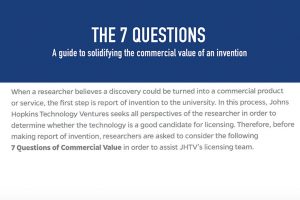Below are some important things to consider as you plan the commercialization of your technology or pursue a business idea.
-
The Commercial Value Proposition
The first step in the commercialization process is to establish the commercial value of the technology. The researcher's perspective is critical in developing the appropriate IP and licensing strategy. Our 7 Questions framework will help prepare you for reporting to our office.
-
Protecting the IP
The sooner JHTV receives a report of invention, the better we can protect any associated IP. JHTV encourages early disclosure, especially prior to any publications, posters or presentations about the research.
-
Conflicts of Interest
Commercialization - especially startup formation - can introduce conflicts of interest or conflicts of commitment for Johns Hopkins inventors. JHTV recommends early consultation with the appropriate office of policy coordination to ensure that potential conflicts are appropriately managed and do not interfere with our goal of bringing your innovation to market. Early discussions help to clarify processes related to the continuation of research (clinical trial participation), collaborations, licensing, financial considerations, and adherence to JHU general policies.
-
Time commitment
For those interested in launching their own company, first-time entrepreneurs frequently underestimate the time and intellectual commitment required to successfully launch a new venture. The burden of these commitments has the potential to adversely impact a faculty member’s or student’s university work. The best guidance on how or even whether to balance these activities comes from those who have done it before.
-
Faculty Role in Startup Companies
An important immediate question for Johns Hopkins University inventors is whether they want to be involved in these tasks directly as part of the company team or to hand off these tasks to professional entrepreneurs and continue in their roles as Johns Hopkins University faculty, research staff, or students. The following chart provides general information about the university’s approach to faculty roles in startups, but the university will respond to a proposed arrangement in the manner that best suits the particular nature of the proposal and related implications.
| Company Role | Institutional Concern | Institutional Approach |
| Founder | Conflict of commitment, conflict of interest | Generally allowed |
| C-Level Executive (CEO, COO, CMO, CSO, etc.) | Conflict of commitment, conflict of interest | May be allowed. If approved, requires a corresponding reduction of university responsibilities and division-approved management plan |
| Research Director, Researcher | Conflict of commitment, conflict of interest, intellectual property | Not allowed |
| Consultant | Conflict of commitment, conflict of interest, intellectual property | Generally allowed with a division-approved management plan |
Planning to form a startup?
The Johns Hopkins Startup Guide provides important information about the process of forming a company around university technology.




